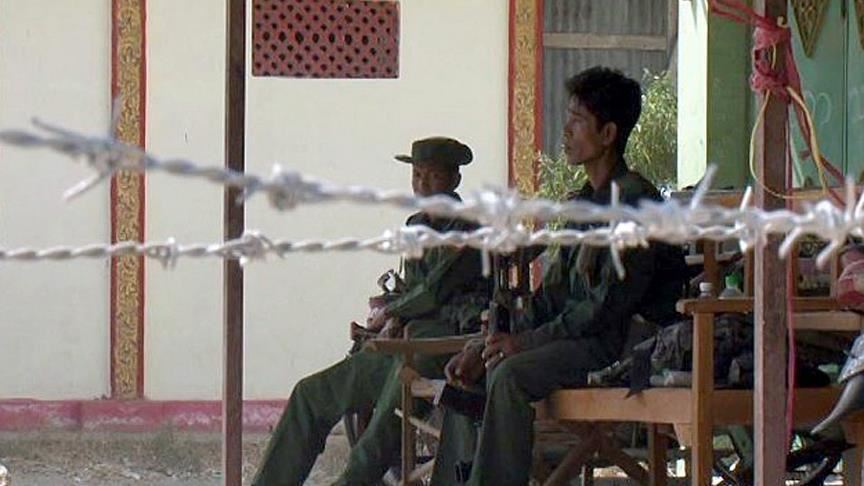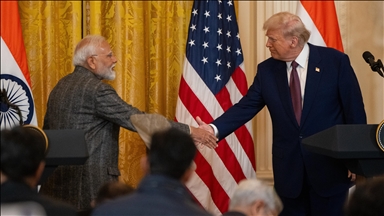Myanmar-China trade hurt by rebel attacks
Intense fighting along major route halts fortune in cross-border trade
 FILE PHOTO
FILE PHOTO
YANGON, Myanmar
Cross-border trade between Myanmar and China has ground to a halt since rebels launched coordinated attacks on several targets along a major trade route on Aug. 15.
The Northern Alliance -- a rebel collation of the Ta’ang National Liberation Army (TNLA), Arakan Army and Myanmar National Democratic Alliance Army -- attacked a major military training academy near Myanmar’s second largest city, Mandalay, and several positions in northeastern Shan state bordering China.
The Myanmar government said the attacks left at least 15 dead, including three civilians, and caused around $200,000 worth of damage to properties and buildings.
Trade halt
The attacks, however, had a larger impact on cross-border trade between the two countries.
While retreating following the attacks last Thursday, the rebels blew up Gok Twin bridge, which is on a major highway connecting the city of Mandalay and town of Muse, the biggest border trading point between Myanmar and China, blocking the flow of goods.
According to government data, the bilateral trade volume through Muse totaled $4.28 billion in the 2018-19 fiscal year from Oct. 1, 2018 to Aug. 9, 2019.
“There has been no flow of commodities from Muse to Mandalay since the Gok Twin bridge was blown up a week ago,” said Khin Maung Thein, chairman of the Highway Freight Transportation Service Association in Shan state.
Rebels also blew up a bridge on Aug. 17, blocking daily trade of about $1.5 million between Myanmar and China through the border town of Chin Shwe Haw.
“So the fighting has caused a huge amount of losses,” Thein told Anadolu Agency by phone.
The Myanmar government announced Wednesday that a temporary bridge had been completed and vehicles weighing a maximum of 36 tons are allowed to pass over it.
It added that vehicles weighing up to 48 tons would be allowed to use it in the next 30 days.
Fierce fighting
Since the attacks last week, fighting has intensified between the military and the rebels along the Mandalay-Muse trade route.
A volunteer from a local rescue team was among those killed during the fighting along the highway over the past few days.
A leader of a people’s militia force based in northern Shan state was also killed this week after rebels attacked his home near the town of Lashio.
The attack came days after the rebels issued a statement warning members of local people’s militia forces and other ethnic armed organizations in the region not to help the military fight against them.
The Restoration Council of Shan State (RCSS), an ethnic armed organization that signed a government-sponsored ceasefire accord in 2015, has been helping the military in its offensive against the Northern Alliance.
RCSS spokesman Major Sai Kham San told Anadolu Agency that the trade halt would have a negative impact on the country’s economy and people.
“The Northern Alliance aims to disrupt or block trade. It’s totally unacceptable,” he said, adding RCSS members are deployed in some sections of the route.
“No security or stability means no business and no development, so the fighting must be stopped,” he said.
He called on the Northern Alliance to resolve the problem through negotiations.
“Fighting never ends war, but negotiations will,” he added.
Uncertainty
Media reports said the Chinese government condemned last week’s attacks, calling on the rebel alliance to stop fighting immediately.
Leaders of the Northern Alliance were invited to a meeting with Chinese Special Envoy for Asian Affairs Sun Guoxing in Kummin on Tuesday, according to a report by online magazine The Irrawaddy.
China pressured the rebel groups to stop fighting, it said, citing TNLA spokesperson Ta Phone Kyaw.
The rebel alliance demanded the military to halt operations in western Rakhine state and Shan state.
“If our demands are met, the fighting will stop,” Kyaw was quoted as saying.
Anadolu Agency was unable to reach the military for comment.
Despite the opening of the temporary bridge, Thein said hundreds of vehicles loaded with imported goods are still stranded in Muse.
“These trucks mostly weigh 50-60 tons. So a permanent bridge is vital to the flow of commodities,” he said.
He added, however, that even if a new bridge or new highway is built, the lack of security will remain a problem for steady cross-border trade.
“We don’t know when trade will resume and be normal again.”
Anadolu Agency website contains only a portion of the news stories offered to subscribers in the AA News Broadcasting System (HAS), and in summarized form. Please contact us for subscription options.







